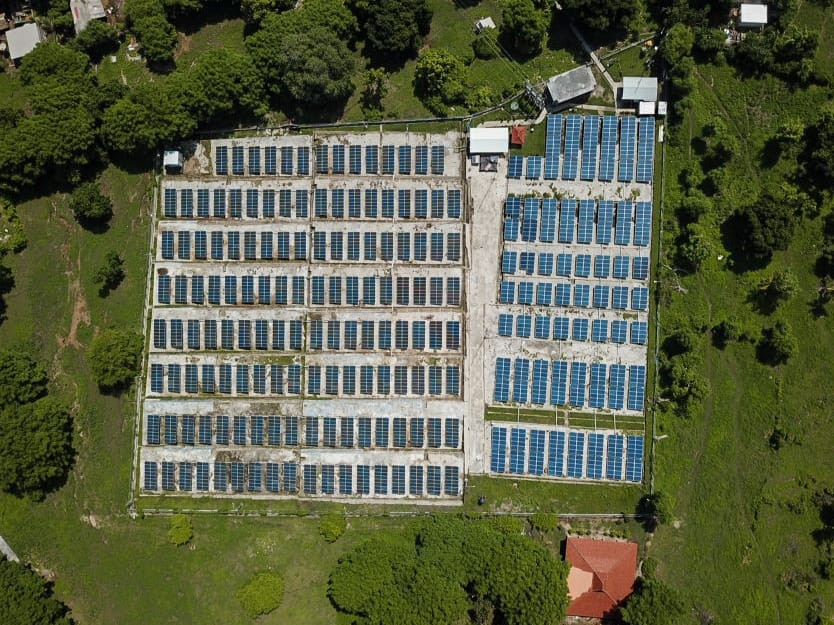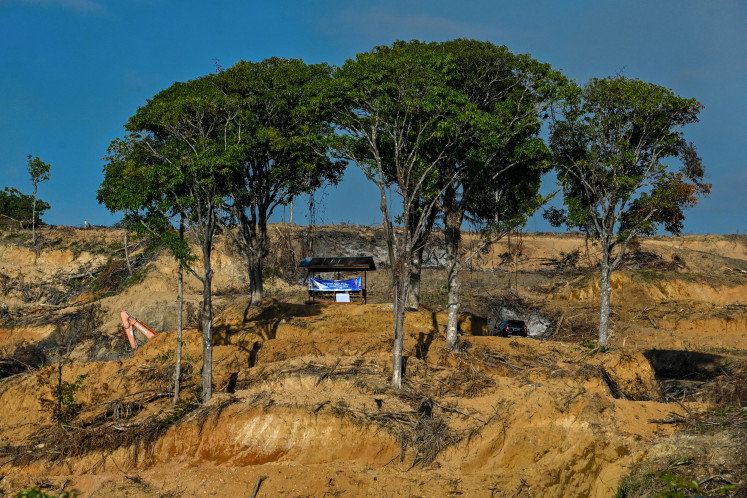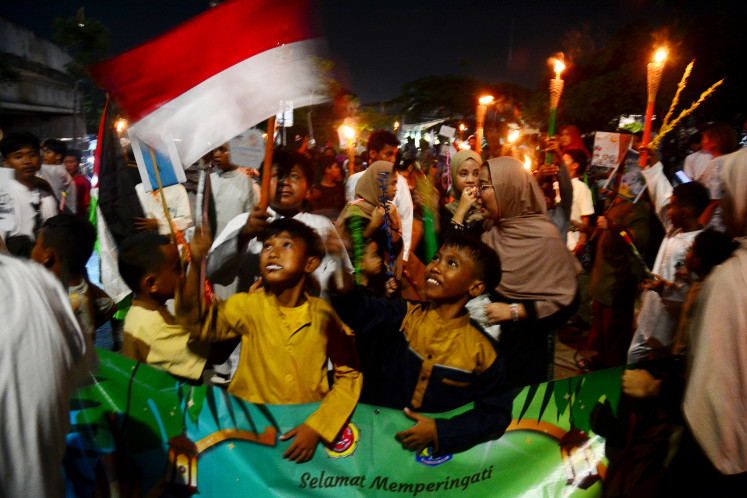Popular Reads
Top Results
Can't find what you're looking for?
View all search resultsPopular Reads
Top Results
Can't find what you're looking for?
View all search resultsThe color of economic recovery is green
While many have prematurely celebrated the predicted 8 percent reduction in greenhouse gas emissions this year, the world needs to remain watchful.
Change text size
Gift Premium Articles
to Anyone
W
ith the impacts of the COVID-19 pandemic felt far and wide, almost all countries are now in combat mode: issuing and implementing various policies to stop the spread and to cushion the impacts on the economy and people’s livelihood.
For that purpose, governments have allocated more than US$12 trillion in the form of direct budget support, loan and equity injections, guarantees and other incentives. According to Energy Policy Tracker only a small fraction of $88 billion is aimed at clean energy, which is only half than stimulus for fossil fuels.
Learning from the past recession, there will be a spike in human and industrial activity post-crisis along with a bounce back in the economy. Carbon emissions dropped 1.4 percent in 2009 after the 2008 financial crisis, but rose 5.1 percent in 2010.
While many have prematurely celebrated the predicted 8 percent reduction in greenhouse gas emissions this year, the world needs to remain watchful.
Green growth, as a means of doing the best for people and the planet, has been proven to be economically effective, particularly in response to crisis. The International Energy Agency (IEA) highlighted how green stimulus programs in response to the 2008-2009 economic crisis had played an important role in recovering the economy in China, Japan, Korea and the European Union.
A recent study from Oxford University, co-authored by prominent experts including environmental economist Cameron Hepburn and Nobel laureate Joseph Stiglitz, also found large support for green economic measures from the respondents of the study (central bankers, finance ministers and academics). Their key question did not solely mention climate targets, but also the speed of implementation, long-run economic multiplier and policy desirability. Clean energy policies, particularly clean energy R&D, infrastructure and clean connectivity infrastructure, were listed in the top 10 desired recovery policies, considered having large long-run multipliers and a strong positive impact on the climate. Just last month, the IEA also issued its Sustainable Recovery Report, echoing the need to push for climate-oriented recovery and to “build back better”.
The Asian Development Bank (ADB) predicted that Indonesia’s economy would grow 2.5 percent in 2020, a stark contrast to 5 percent growth last year. Economic growth in the second quarter is negative and future growth remains bleak.
Undoubtedly, the Indonesian government needs to disburse economic stimulus to create growth. The growing voice to encourage greener measures, however, has yet to resonate in Indonesia. The government has designated Rp 695.2 trillion ($48 billion) for COVID-19 measures and economic stimulus packages, yet none was allocated to green stimulus.
Vivid Economics has been reviewing the “greenness” of 17 major economies’ COVID-19 stimulus injected into sectors that have long-term impacts on nature, and it suggested that Indonesia’s stimulus falls into the “brown” category (and has the lowest score), dominated by support for the high-carbon industry and energy sector.
Indonesia should opt for renewable energy for economic development, particularly in this difficult time and to reduce future greenhouse gas emissions. Currently, the share of renewable energy in Indonesia’s power sector is only 2 percent of total potential - a result of intertwining factors: a lack of consistent and supportive policies, market barriers, as well as concerns about human resources and grid readiness.
Solar energy, with the highest potential (of more than 200 GW nationwide), has yet to boom despite the global trend showing the exact opposite. Benefiting from massive deployment globally and a sharp decline in technology prices, solar energy could play an instrumental role in reviving Indonesia’s economy - and by extension, opening the doors to rapidly develop other renewables, keeping on track with our national energy target and climate pledge.
The Jakarta Post reported on June 19 that the Energy and Mineral Resources Ministry was working on a $1 billion solar program. It targets 1 gigawatt-peak (GWp) annual installations of rooftop solar for households receiving electricity subsidies. If prepared and implemented properly, this national solar program could be the answer to Indonesia’s absence in disbursing green stimulus: providing energy safety nets, boosting domestic solar industry and creating employment.
We estimate that this program could generate up to 30,000 green jobs per annum, much needed to fill in the gaps in recovering the economy.
The program is only one form of strategy for green economic recovery, and it is clearly not sufficient. As Indonesia aims to reach a 23 percent share of renewable energy in the primary energy mix by 2025, an additional $3 billion to $5 billion investment (in the renewable energy sector alone) is required. Building gigawatt solar plants and rooftop solar could be the fastest way to meet this target in due time. Unfortunately, Indonesia's renewable energy investment attractiveness is pretty low.
The long-awaited presidential regulation on renewable tariffs and procurement of renewables, as well as the newly announced cooperation between the IEA and Indonesia should come to aid, as they are expected to increase investment attractiveness. Financing support for residential and commercial solar installation could also spur interest in installing rooftop solar, along with removing barriers to connect rooftop solar to state electricity company PLN’s grid.
Given the opportunity and the potential, we call on President Joko “Jokowi” Widodo to set green economic recovery strategies and to take the lead in accelerating energy transition in Indonesia. Putting the stimulus money into fossil fuels and dirty industry is not an option.
The pandemic has given us an opportunity to rethink our development, and we cannot just do business as usual. Carpe diem.
***
Fabby Tumiwa is the executive director of the Institute for Essential Services Reform (IESR), Marlistya Citraningrum is the institute’s program manager for sustainable energy access.










